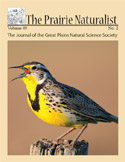Great Plains Natural Science Society

The Prairie Naturalist
Date of this Version
12-2013
Document Type
Article
Citation
The Prairie Naturalist 45: 96–99. December 2013
Abstract
The hispid cotton rat (Sigmodon hispidus) is a widely distributed rodent with a geographic range extending from north-central Mexico to southern Nebraska and central Virginia and from southeastern Arizona east to Florida (Carleton et al. 1999, Peppers and Bradley 2000, Wilson and Reeder 2005) with isolated populations in Arizona (Bradley et al. 2012) and California (Clark 1972). Range expansions for the species have been well documented (Clark 1972, Farney 1975, Benedict et al. 2000, Wright et al. 2010, Wills et al. 2011). The majority of these range expansions have occurred across the Central Plains during the 20th century and have been attributed to climate change (e.g., Benedict et al. 2000, Hoffman 2008).
Bailey (1902) was the first to document movement of S. hispidus into the Central Plains by documenting individuals for the first time in Kansas that most likely moved northward from Oklahoma. By 1947, the species had reached the Kansas/Nebraska border (Cockrum 1948). Just over 10 years later, Jones (1960) reported 12 individuals near the Nemaha River in southeastern Nebraska, and by the late 1960s (Choate and Genoways 1967, Genoways and Schlitter 1967) and mid-1970s (Farney 1975), the species had been documented in several parts of the state.
Included in
Biodiversity Commons, Botany Commons, Natural Resources and Conservation Commons, Systems Biology Commons, Terrestrial and Aquatic Ecology Commons, Weed Science Commons, Zoology Commons


Comments
Published by the Great Plains Natural Science Society, 2013. Used by permission.